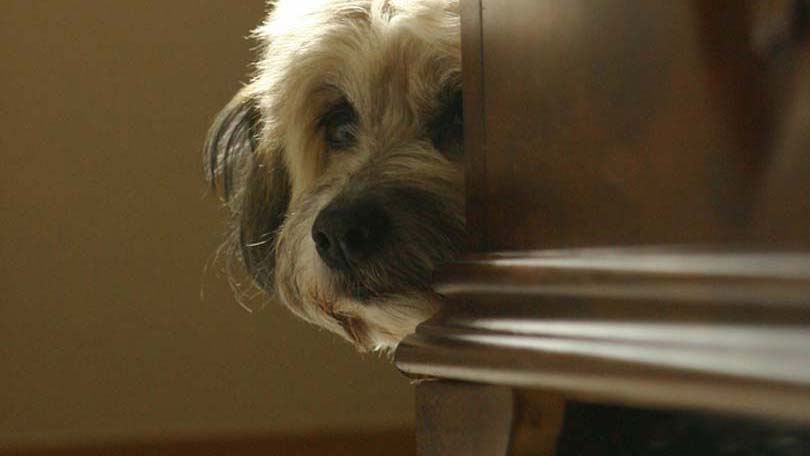
Just like humans, some dogs are inherently shyer than others. Always a debate between nature and nurture, shyness can be a debilitating trait for dog and owner, making both apprehensive about daily walks, trips to the dog park, and even inviting others into the home. If your dog is scared of strangers, do not be discouraged. With proper socialization, obedience training, and leadership (from you, the alpha dog), your canine can overcome his fear of strangers, and become your calm, confident companion.
Although many dog owners assume that a fearful, cautious dog has endured some type of abuse during his life, this is not always the case. Shyness can be cause by genetics, physical ailments, or lack of socialization as a puppy. Shyness can be learned from the mother’s behavior, and dog breeders see that boldness runs in certain bloodlines, while timidity and shyness run in others. Deafness, ear infections, epilepsy, and thyroid problems can cause a more nervous dog, so be sure to have your animal checked by a veterinarian if he suddenly exhibits fearful behavior.
The problem with fear in dogs is that the fear may lead to aggression when your dog’s fight or flight response kicks in. A scared dog will often run away from strangers, cower to look small, or even hide behind its owner for safety. If the dog ever feels trapped, which may only be imagined, but is quite real for the dog, he may lash out by growling, charging, or biting at whomever he feels is trapping him. If this person backs away, the dog will learn that this behavior is effective at getting what he wants (for the stranger to go away), and a new habit of fear aggression will be formed. To avoid this potentially dangerous habit, you must prevent your dog from becoming scared, and also prevent positive rewards for aggressive behavior.
Early socialization is essential to prevent fear in dogs. Socialization allows your dog to develop interactive skills with other dogs, other kinds of animals, and people of all sizes and ages. Puppies, like children or other baby animals, will form memories and associations to what they learn at a young age. If they learn to trust and interact with different people, they will be comfortable with humans later on in life. On the other hand, isolated puppies that have little interaction with people tend to become attached to one person only, the owner. Unfortunately for the dog, he will inevitable have to interact with other people throughout his life, like the vet or groomer. However, one great attribute of dogs is their ability to learn new behavior at any age. If your dog is scared of strangers, it is time to socialize.
A major part of overcoming your dog’s shyness and fear is overcoming your own anxiety and fear about your dog’s behavior toward others. Pay attention to your own actions while walking your dog; do you shorten the leash and tense up when a stranger approaches in anticipation of your dog’s behavior? Do you get nervous before company comes to your home because you are fearful of how your dog will interact with them? Just as your dog will grow more fearful by sensing your anxiety and stress, he will find confidence in your strong, assertive leadership. You must become the alpha dog, or pack leader, so that your dog can relax knowing that he is safe under your care. Establish your dominance through walks and obedience training, and be aware of your own mental state during interactions with strangers. During personal interactions, instruct others on how to behave with your dog. On first meeting, there should be no eye contact or touching; the stranger should act disinterested in your dog. This allows your dog to have his own personal space, and not to be threatened by what he perceives to be a dominant stranger.
Remember, you know your dog better than anyone else, so be aware of his mental state at all times. Start small with desensitization and socialization. If your dog is afraid of children, hats, or loud noises, begin to expose him to just those things, in very small doses at first. Increase exposure only as your dog becomes more comfortable. Take your dog for a walk past a school or daycare while children are outside. To keep his mind from focusing on the children, ask him to sit, or lay down; as long as he is focusing on you and the rewards for his good behavior, his mind cannot be consumed with fear. It is extremely important to remain upbeat and positive during these training sessions, as your dog will feed off of your mood. You can correct your dog for not obeying a command, but do not punish for fearful behavior, as this will only increase anxiety. Continue the socialization with small steps forward, introducing your dog to more and more people over time. Socialization is a life long process; the learning never ends for your dog!
Eventually, you will begin to see your dog relax in different environments and situations as he learns that you will keep him safe. When your dog is scared of strangers, it is usually a sign of low confidence. Teaching him to remain calm around other dogs and people will actually improve his state of mind, and you will have a happier, stable pet that can accompany you anywhere you need to go!





